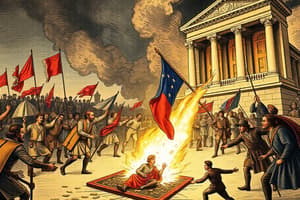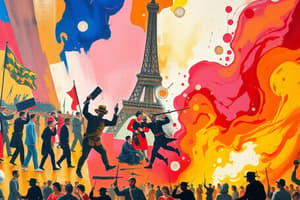Podcast
Questions and Answers
What misguided belief fueled resentment among the Third Estate prior to the French Revolution?
What misguided belief fueled resentment among the Third Estate prior to the French Revolution?
- The belief that economic conditions would improve.
- The belief that the monarchy had their best interests at heart.
- The belief that they were the only class responsible for taxation.
- The belief that they had equal rights with the nobility and clergy. (correct)
Louis XVI effectively addressed the financial and social issues facing France before the revolution.
Louis XVI effectively addressed the financial and social issues facing France before the revolution.
False (B)
Which phase of the French Revolution is characterized by the execution of Louis XVI and the Reign of Terror?
Which phase of the French Revolution is characterized by the execution of Louis XVI and the Reign of Terror?
- The Radical Phase (correct)
- The Moderate Phase
- The Thermidorian Reaction
- The Directory
Who was the queen of France during the French Revolution, often criticized for her extravagance?
Who was the queen of France during the French Revolution, often criticized for her extravagance?
The Directory was established after the execution of Robespierre.
The Directory was established after the execution of Robespierre.
The Enlightenment emphasized reason, individual rights, and __________ as a basis for government.
The Enlightenment emphasized reason, individual rights, and __________ as a basis for government.
What major document was established during the Moderate Phase?
What major document was established during the Moderate Phase?
Match the key figures of the French Revolution with their roles:
Match the key figures of the French Revolution with their roles:
What was one of the main economic issues faced by France prior to the revolution?
What was one of the main economic issues faced by France prior to the revolution?
The five-man executive body that ruled France from 1795 to 1799 is known as the ______.
The five-man executive body that ruled France from 1795 to 1799 is known as the ______.
Philosophers like Rousseau and Montesquieu supported the idea of absolute monarchy.
Philosophers like Rousseau and Montesquieu supported the idea of absolute monarchy.
Which of the following was NOT a key event of the Radical Phase?
Which of the following was NOT a key event of the Radical Phase?
What was the primary consequence of the economic crisis in France before the revolution?
What was the primary consequence of the economic crisis in France before the revolution?
Match the following revolutionary impacts with their descriptions:
Match the following revolutionary impacts with their descriptions:
The Thermidorian Reaction was a period marked by increased radical policies.
The Thermidorian Reaction was a period marked by increased radical policies.
Who was the prominent leader associated with the Radical Phase?
Who was the prominent leader associated with the Radical Phase?
Flashcards
French Estates System
French Estates System
A social hierarchy with three estates (clergy, nobility, and commoners) with different rights and privileges.
Economic Crisis (France)
Economic Crisis (France)
France's severe financial problems before the revolution, caused by taxes, poor harvests, and extravagant spending.
Absolute Monarchy
Absolute Monarchy
A system of government where all power is held by a single ruler.
Enlightenment Ideas
Enlightenment Ideas
Signup and view all the flashcards
Louis XVI
Louis XVI
Signup and view all the flashcards
Marie Antoinette
Marie Antoinette
Signup and view all the flashcards
Reign of Terror
Reign of Terror
Signup and view all the flashcards
Georges Danton
Georges Danton
Signup and view all the flashcards
Moderate Phase of French Revolution
Moderate Phase of French Revolution
Signup and view all the flashcards
Radical Phase of French Revolution
Radical Phase of French Revolution
Signup and view all the flashcards
Thermidorian Reaction
Thermidorian Reaction
Signup and view all the flashcards
Directory (French Revolution)
Directory (French Revolution)
Signup and view all the flashcards
Spread of Nationalism
Spread of Nationalism
Signup and view all the flashcards
Rise of Liberalism
Rise of Liberalism
Signup and view all the flashcards
Rise of Conservatism
Rise of Conservatism
Signup and view all the flashcards
Napoleon's Rise to Power
Napoleon's Rise to Power
Signup and view all the flashcards
Study Notes
Causes of the French Revolution
-
Social Inequality: The French social structure was highly stratified, with the First Estate (clergy), Second Estate (nobility), and Third Estate (commoners) possessing vastly different rights and privileges. The Third Estate, comprising the majority of the population, bore the brunt of taxation while the privileged estates enjoyed significant exemptions. This disparity fueled resentment and a desire for change.
-
Economic Crisis: France faced severe economic hardship in the years leading up to the revolution. High taxes, poor harvests, and extravagant spending by the monarchy created a massive debt crisis. Widespread poverty and food shortages further exacerbated the situation, leading to widespread suffering among the common people.
-
Political Absolutism: The French monarchy was an absolute monarchy, with significant power centralized in the hands of the king. Louis XVI's weak leadership and failure to address the nation's problems further fueled public discontent. A lack of political representation for the Third Estate contributed to the feeling of being ignored and unheard.
-
Enlightenment Ideas: The Enlightenment's emphasis on reason, individual rights, and popular sovereignty provided intellectual ammunition for revolutionaries. Philosophers like Rousseau and Montesquieu challenged the legitimacy of absolute monarchy and advocated for systems of government based on the consent of the governed. These ideas resonated with those seeking change.
Key Figures
-
Louis XVI: The king of France during the revolution. His indecisiveness and failure to address the country's problems contributed significantly to the revolution's outbreak.
-
Marie Antoinette: Louis XVI's queen. Her perceived extravagance and foreign origins made her a target of public resentment.
-
Maximilien Robespierre: A key figure in the radical phase of the revolution. He led the Reign of Terror, a period of intense violence and repression aimed at eliminating counter-revolutionaries.
-
Georges Danton: A prominent revolutionary leader who played a crucial role in early stages of the revolution, advocating for a more moderate approach.
-
Marat: A radical journalist who incited revolutionary fervor through his writings.
Phases of the Revolution
-
The Moderate Phase (1789-1792): This phase saw the storming of the Bastille, the Declaration of the Rights of Man and of the Citizen, and the establishment of a constitutional monarchy. Key events included the National Assembly's formation, the abolition of feudalism, and the move towards a more representative form of government.
-
The Radical Phase (1792-1794): Characterized by the Reign of Terror, the execution of Louis XVI and Marie Antoinette, and the rise of a republic. The radicalization of the revolution was driven by internal conflicts and the threat of foreign intervention. Robespierre's leadership dominated this period.
-
The Thermidorian Reaction (1794-1795): A reaction against the Reign of Terror. Robespierre was executed, and the revolution took a more moderate course, culminating in a new constitution and the establishment of the Directory.
-
The Directory (1795-1799): A five-man executive body that ruled France after the Reign of Terror. This period was marked by political instability, corruption, and economic difficulties. Eventually, it was overthrown by Napoleon Bonaparte.
Impact on Europe
-
Spread of Nationalism: The revolutionary ideals of liberty, equality, and fraternity inspired nationalistic movements across Europe. People in various countries began to demand greater self-determination and political reform.
-
Rise of Liberalism: The French Revolution challenged the established order and paved the way for the spread of liberal ideals. These concepts emphasized individual rights, limited government, and constitutionalism.
-
Rise of Conservatism: The revolutionary violence and instability also led to the rise of conservative thought, which aimed at preserving traditional social structures and values to counter the perceived excesses of the revolution.
-
Rise of Napoleon: The instability and weak leadership of the Directory created an opportunity for Napoleon Bonaparte to seize power, ultimately leading to the Napoleonic Wars which impacted a large portion of Europe.
-
Revolutions in Other Countries: Events in France inspired similar revolutionary movements in other parts of Europe. These movements, while often with unique characteristics, shared the common theme of challenging oppressive regimes and striving for greater political and social rights.
Studying That Suits You
Use AI to generate personalized quizzes and flashcards to suit your learning preferences.




